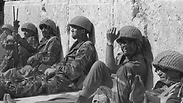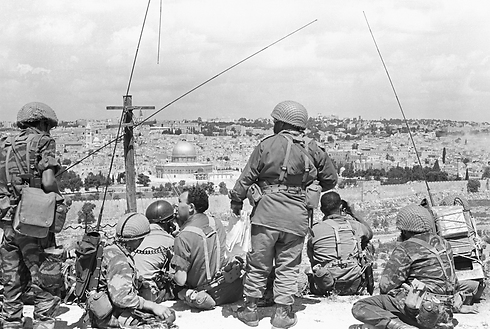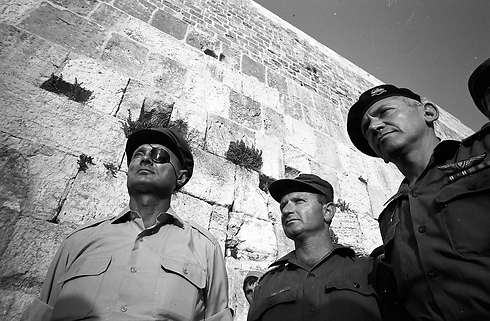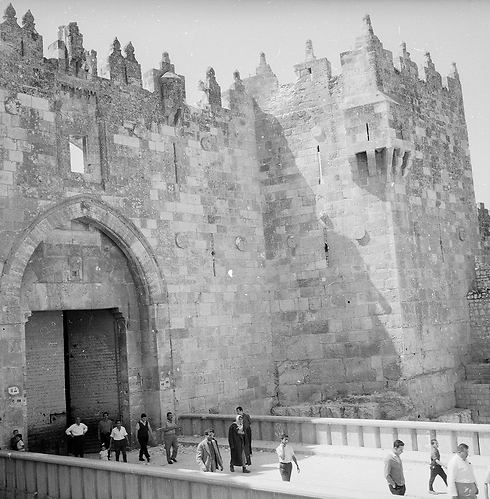
‘We will become a minority in Israel’: Six-Day War cabinet minutes released
The theme of almost every sentence from the secret cabinet meetings on the future of the territories following the stunning Israeli victory echo in today’s political discourse; ‘We must not return an inch of land,’ Minister Begin stated, while Defense Minister Dayan called for a military rule in the West Bank; Minister Sapir’s comment reflected the dilemmas that remain in the heart of Israel’s political debate 50 years later: ‘We can win a war and then be in a constant battle which is worse than a war.’
On June 11, 1967, Israel’s citizens woke up to a different reality that would shape the course of their history up to at least the present day. Following the stunning victory over the region’s armies, the young state’s territory grew fourfold in one military sweep, incorporating into its jurisdiction an Arab population of about one million people.
When the battles ended and the euphoria subsided, Israel was required to form its stance on the future of the territories it had conquered and the Palestinian residents living there, ahead of United Nations sessions on the issue. Every sentence uttered in those secret discussions reflects the dilemmas and disputes that have remained at the heart of Israel’s political discourse to this very day.

In honor of the 50th anniversary of the Six-Day War, the Israel State Archives released the transcripts of cabinet meetings and discussions of the ministerial committee on security affairs since the beginning of the tensions with Egypt and Syria, through the actual days of battle, to the months after the war, when Israel was forced to deal with the new reality.
June 10, 1967: What should be done with population in occupied territories?
In the cabinet meeting held Saturday evening, the ministers decided to halt the fighting on the northern front and bring the war to an end. After Education and Culture Minister Zalman Aran concluded that “this is the most legendary war in the history of the Jews’ wars and it will sustain the Jewish people for generations,” the ministers stood up to honor the memory of the fallen soldiers and raised a toast “L’chayim” (to life).
At the conclusion of the meeting, Prime Minister Levi Eshkol told his circle that “We have to decide what to do with the Arab citizens in the occupied territories,” thereby seeting the stage for a debate that has continued up to the present day.
June 14, 1967: Discussing evacuation of Arabs from Jewish Quarter
At the end of the Shavuot holiday, the cabinet convened for a five-hour discussion, which began with a diplomatic briefing by Israel’s Ambassador to the UN, Gideon Rafael, who updated the ministers: “The United States said to us, ‘Help us. If you act modestly and talk less about territorial ambitions, but talk about security needs, the freedom of navigation and rights that you are entitled to, it will be much easier to enlist support at the UN.’”
Foreign Minister Abba Eban added, “The public opinion in the US is starting to turn against us. Words of criticism are being revealed against our desire to hold onto territory which isn’t ours. We are being advised to avoid any announcements on annexation plans and to present a less triumphant and more constructive appearance. The US government would like to know what are views are regarding the territorial questions, the refugee problem and Jerusalem’s status, in order to allow it to form its policy. It seems to me that the government will soon have to take a stand on how it wants to rebuild the Middle East.”
Minister Yosef Sapir spoke about the difficulty in presenting a stance arguing that Israel’s right to security allows it to hold onto the territories incorporated into its ranks after the war: “If this is about security, I don’t know what is left of the West Bank, strictly between ourselves. We’ll go back to ruined Qalqilya and keep it, and the result will be that we won’t achieve peace.”
Minister Menachem Begin, the soon-to-be prime minister who staunchly advocated holding onto the new territories, replied: “Heaven forbid, we must not be tempted to chase moderation by saying that we have no territorial claims. We sat where we are sitting today 4,000 years ago. We should ‘electrify’ the Jews of America and hold mass protests, not just of Jews, but of Christians too.”
The first issue the ministers discussed was Jerusalem’s future. They agreed that the two parts of the city must be united and that the Old City’s Jewish Quarter must be rebuilt, especially the synagogues in it. At that point, however, there were Arabs living in the Jewish Quarter, and the cabinet members were at odds over the way they should be handled.
“There was an idea to perhaps clear the Jewish Quarter of houses and move the Arab population elsewhere,” Eshkol said. “There are 2,000 Arab families living there. There was thought to perhaps start rebuilding the synagogues first, and it’s also dozens of families, and these homes are destroyed with bulldozers. Perhaps if they see that all hope is lost, they will move on their own.”
Development and Tourism Minister Moshe Kol opposed the move. “I am against removing the Arabs from the Old City’s Jewish Quarter at this time, so as not to spark a dispute before the UN General Assembly session,” he said, before Deputy Prime Minister Yigal Allon demurred. “I am in favor of clearing the Jewish Quarter of Arabs. If it isn't done in the next couple of days, it will never be done. In addition, we should encircle the Old City with beautiful Jewish neighborhoods.”
Defense Minister Moshe Dayan stressed, “We must decide to do that, and if we do, it has to be now. Within two-three days we’ll move them to empty houses around Jerusalem, from Sur Baher to Ramallah. We won’t throw them out on the street. The houses that are standing empty won’t be empty in a week from now. Bethlehem was nearly empty, and in the meantime, they started coming back. If we don’t do it now, there won’t be houses to transfer them to.”
Eshkol clarified his position on the matter. “If these families are moved to other homes, I won’t object. And if the owners of that house arrive, we’ll evacuate them from this neighborhood to another neighborhood, but not in the Old City. It might be possible to find an empty compound in the Arab quarter and settle Jews there, but it’s clear that we must first settle Jews in the Jewish Quarter.”
At the end of the war it was decided to do everything in the government’s power to evacuate the Arabs living in the Jewish Quarter to other places in and around Jerusalem. If the reconstruction of the quarter required home demolitions, the cabinet would decide on the timing.
10 am, June 15, 1967: An autonomic region vs. martial law
After deciding in the previous meeting that Jerusalem would not be divided again, the cabinet held a short meeting, the first in a series of discussions aimed at forming an Israeli stance on the future of the additional territories, focusing on the issue of the West Bank and its residents.
Foreign Minister Abba Eban briefed the ministers on the American stance: “Their feeling is yes to Jerusalem, but no to the territories. They are stressing that it would be very bad if the world gets the impression that we really intend to hold onto the entire territory.”
Allon: “Let’s annex Mount Hebron till the Dead Sea, the Judea Desert plus greater Jerusalem to the State of Israel, with its Arab population. There will be one more ‘Galilee.’” Allon suggested turning the West Bank into an autonomic Arab region. “In this case,” he said, “they don’t get a voting right. I don’t care if the autonomic region is called Palestine, if they find it convenient.”
Eshkol: “I accept that Jordan is the border. We can’t take in 1 million or 1.2 million refugees and additional Arabs, because then we’re lost. We won’t be able to keep up with them in terms of birthrate, and in a few years they will ask why they don’t have a voting right, and then we’ll have terrible international problems.”
Begin: “As for the eastern Land of Israel, we must not return an inch of land, because returning means handing it over to foreign rule. We liberated part of the Land of Israel. The concept of the Land of Israel includes Gaza as well. There are historical rights. Now the question is what will happen with the Arabs. I see a very great danger in declaring an autonomic region, because we may be calling for pressure for a Palestinian state. I suggest that we consider the following arrangement: For seven years, they will be residents rather than citizens. At the end of the seven years, we will be able to ask each and every one of them if he wishes to be a loyal citizen or perhaps wants to go to a different state.”
Dayan: “The Israeli border is eastern Jordan. The West Bank is not Hussein, and Gaza isn’t Nasser. It’s Israel. Internally I say, don’t take in another million Arabs. In the West Bank, we must stick to a military rule for a long period of time. We won’t make any move which will drag us into a situation in which they will be able to vote for the Knesset.”
Eban: “I suggest that it be an independent region to all intents and purposes, that there will be an autonomous region and that they will be independent in every area, apart from foreign and security affairs which are reserved for the central government.”
Allon: “Since we view the Jordan River as Israel’s border, I suggest that we create a settlement strip in the Jordan Valley.”
Dayan: “In my opinion, there is no need to do that. If there is a need from a security perspective, we can station tanks somewhere, but I wouldn’t recommend something that would mean settling in the area. I wouldn’t want to start now with a settlement of the past.”
Begin: “Nevertheless, we must speed up one process—creating a mixed population in the big cities like Hebron, Bethlehem, etc.”
Eshkol: “Perhaps we can move doctors, teachers and professionals. Perhaps we can open a yeshiva in Hebron again.”
Dayan: “If we say we don’t want the Arabs of Nablus to go to Haifa, we can’t demand that Jews settle in Hebron. We must decide if everyone is entitled to travel anywhere or if it’s a separate area.”
Begin: “In military rule there isn’t always free movement.”
Dayan: “Apart from Jerusalem, I wouldn’t engage in any settlement now, neither in Gush Etzion nor in the Arava or in Hebron. I want to look into a possibility of a geographic line, so that they will be there and we will be here. I don’t want us to declare an autonomy, because for me this issue of preventing a million Arabs from joining Israel is as important as the West Bank.”
5 pm. June 15, 1967: ‘We’re going to get into trouble with the West Bank’
Dayan: “I suggest that the West Bank regime will be a military rule, in which Arabs from there won’t cross into the Israeli territory, and vice versa. There is a geographic division here, and we are not starting a carnival in which we travel freely to the Cave of the Patriarchs and to Gush Etzion and they have Israeli relatives and travel here. Apart from Jerusalem, the border that existed will remain—they will be there and we will be here.
“As to Hebron and Bethlehem, we will make arrangements. Jews will want to travel to the Cave of the Patriarchs, tourists will want to go to Bethlehem—we will make arrangements for them. The only exception is Jerusalem, which moves to Israel. Jerusalem will be treated like Nazareth. We have received another 100,000 Arabs, however.”
Allon: “In Hebron, Bethlehem and the surrounding villages, there are about 60,000 Arabs—not such a terrible number, until we give up this important enclave, both for historical and religious reasons and for strategic reasons. For an addition of a few tens of thousands, I wouldn’t give up Hebron. At the same time, we must create settlement facts on Mount Hebron and in that same area. We must also establish 12 communities, kibbutzim and others, in the Hebron and Bethlehem area. We must not even wait a month, and must immediately start building a chain of communities. We will build this strip precisely during the period of shock. We must start getting the West Bank’s Arabs used to the fact that they cannot move eastward or westward from their place of residence within today’s State of Israel.”
Eshkol: “Every intelligent gentile with a conscience will want things to be cleared. If you tell him, give me six months to study the issue and in the meantime there will be a military rule—fine. But will they let us keep them that way for many years?”
Minister Yisrael Barzilai: “I think we are going to get into trouble with this whole thing called the West Bank. We want a new territory without the residents living there. You take a territory without resident, you don’t give the residents civil rights. They are not citizens for all intents and purposes and won’t be citizens for all intents and purposes. I don’t know why we are afraid to think about a possibility of a dialogue with Hussein and with Jordan. If it turned out that he was able to accept some of Nablus with something else, it’s possible that we would then receive both a minimum number of residents that remain with us and most of the territory. It may be a fantasy in any case. Why are we afraid to talk to him and look into the issue?”
Begin: “It doesn’t ring like a fantasy, but like a catastrophe. Namely, handing part of the western Land of Israel to Hussein.”
Eshkol: “One thing is clear to me: I don’t want more land and I don’t want more Arabs. The question is when will we become a minority in the state.”
Begin: “I want all the cabinet ministers to know that when we build the expanded Jerusalem, this city’s Arab residents won’t immediately become citizens of the state according to international law, unless we give each and every one of them the citizenship. Citizenship is not granted en mass, but each person receives the citizenship.”
Kol: “These Arabs were born in the Land of Israel and you won’t treat them the way immigrants who came from other countries are treated. Logic will lead to the Land of Israel’s transformation into a binational state, according to the path you are taking. You in Israel will have to treat the Arab resident like the finest nations of the world. We do not wish to persecute monitories. Someone approached me yesterday and said, ‘The state’s name should be changed. It should be called the Land of Israel.’ People are having many thoughts right now.”
Finance Minister Pinhas Sapir: “We can win a war and then be in a constant battle which is worse than a war.”
Eban: “Minister Begin’s proposal to include the entire area in Israel without granting citizenship has a vision of geographic integrity, historical integrity, the homeland’s integrity. But when I analyze it, I reach the conclusion that it’s a powder keg. We are sitting with two populations, one which has all civil rights and the other which is denied of any rights. In other words, this seemingly splendid sight at first glance becomes very gloomy.”
Aran: “It’s an illusion to think that we will hold Arabs in Israel and won’t give them any rights. I would like to say that to the State of Israel’s patriots. With my simple mind I say, we could reach Israel’s defeat—Heaven forbid—through victory, because it won’t be the State of Israel with everything that it implies. Why do we need that? The way of thinking about the West Bank should be, in my opinion, what not to do. It’s perfectly clear to me that we are taking upon ourselves a strangling rope from different aspects without any benefit apart from historical sentimental satisfaction. The people of Israel have lived for 4,000 years, and will keep on living.”













